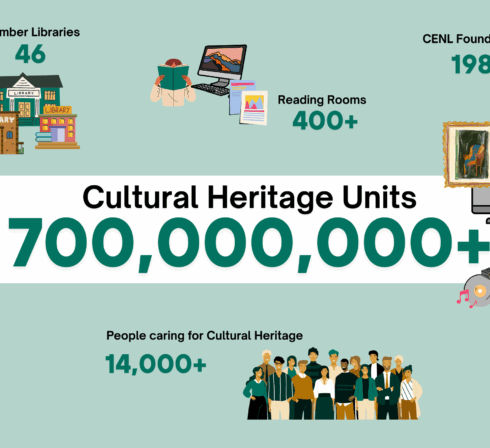National libraries typically play a central role in their country’s library and information landscape. They often have special responsibilities that are defined by law. While their exact duties can vary, they usually include:

Sometimes working closely with national governments, national libraries may help shape national information policies and serve as key voices for the broader library and information community. Occasionally, they also serve the information needs of their legislature directly.
To ensure free and unhindered access to information and documentation, national libraries need to secure their own position. The information must be as complete as possible, clearly organised, prompt and reliable. In today’s interconnected world, it is therefore necessary to develop new models of cooperation and share tasks and resources. In this regard, national libraries can serve as focal points within cooperative networks as trusted partners.
European national libraries are particularly well-suited to promoting cultural and scientific understanding. Representing the European heritage with deep historical roots, they provide essential services for modern research, education and training. Beyond their political and cultural significance, they are dynamic institutions. They are at the heart of national and European knowledge networks. One of the important networks is the Conference of European National Librarians, CENL.
Despite the diversity of national interests, since its first days CENL’s focus has always been on networking and the willingness to cooperate. In February 1987, the Portuguese Secretary of State for Culture welcomed the heads of ten Western European national libraries to Lisbon. The Director of the National Library of Portugal had invited his counterparts from Denmark, Spain, France, Germany, Greece, Luxembourg, the Netherlands, Norway, the United Kingdom and the Vatican to discuss a range of topics. These included interconnecting computer networks, acquisition policies, stock preservation, financial issues and national and European book policies. At the end of the meeting, they made a clear commitment to cooperating in these areas.
From the start, CENL has focused on safeguarding Europe’s cultural heritage and improving preservation and services. Personal meetings were intended to provide an opportunity to discuss common problems and how to handle poor resources in depth, and to develop joint strategies. Each annual meeting should also include a significant social element, allowing ample time for members to get to know one another, as well as to experience the cultural and social life of the host cities.
If you would like to read more about the early years 1987 – 1993 of CENL, see the article “Europe’s National Libraries – The Memory of the Continent” by Renate Gömpel (German National Library).
Having started as a small group of just 11 countries, CENL quickly grew in size after the fall of the Iron Curtain. In 1991, CENL hosted its first East-West conference in Vienna, bringing together directors of national libraries from across Western and Eastern Europe. The aim was to foster stronger connections and establish lasting partnerships. The event proved to be a milestone, producing tangible outcomes and laying the foundation for continued collaboration.
Even today, more than 30 years later, the topics identified at the initial meeting are still considered to be central to CENL’s work – having been shaped by evolving technologies and the changing role of national libraries.
These key areas include:
What started as a dialogue has grown into an ongoing, dynamic effort to strengthen and innovate the work of national libraries across Europe. In December 1998, the legal status of CENL changed – it became a foundation under Dutch law, based in The Hague.
Membership is open to all directors of national libraries in a member state of the Council of Europe and Vatican City and must be approved by the existing CENL members. The foundation is chaired by one of its members. Between 1987 and 2025, CENL was led by directors from five national libraries: British Library (1987 to 1990, 2016-2020), German National Library (1991-1997, 2005-2011 and 2021 onwards), Koninklijke Bibliotheek of the Netherlands (1998-2002), Swiss National Library (2003-2004) and the Bibliothèque nationale de France (2012-2015).
Since 1987, CENL members have met annually in different countries. This has not only given them the opportunity to discuss common issues, but also to experience the rich cultural heritage of Europe. This is an important prerequisite for mutual understanding on an international level.